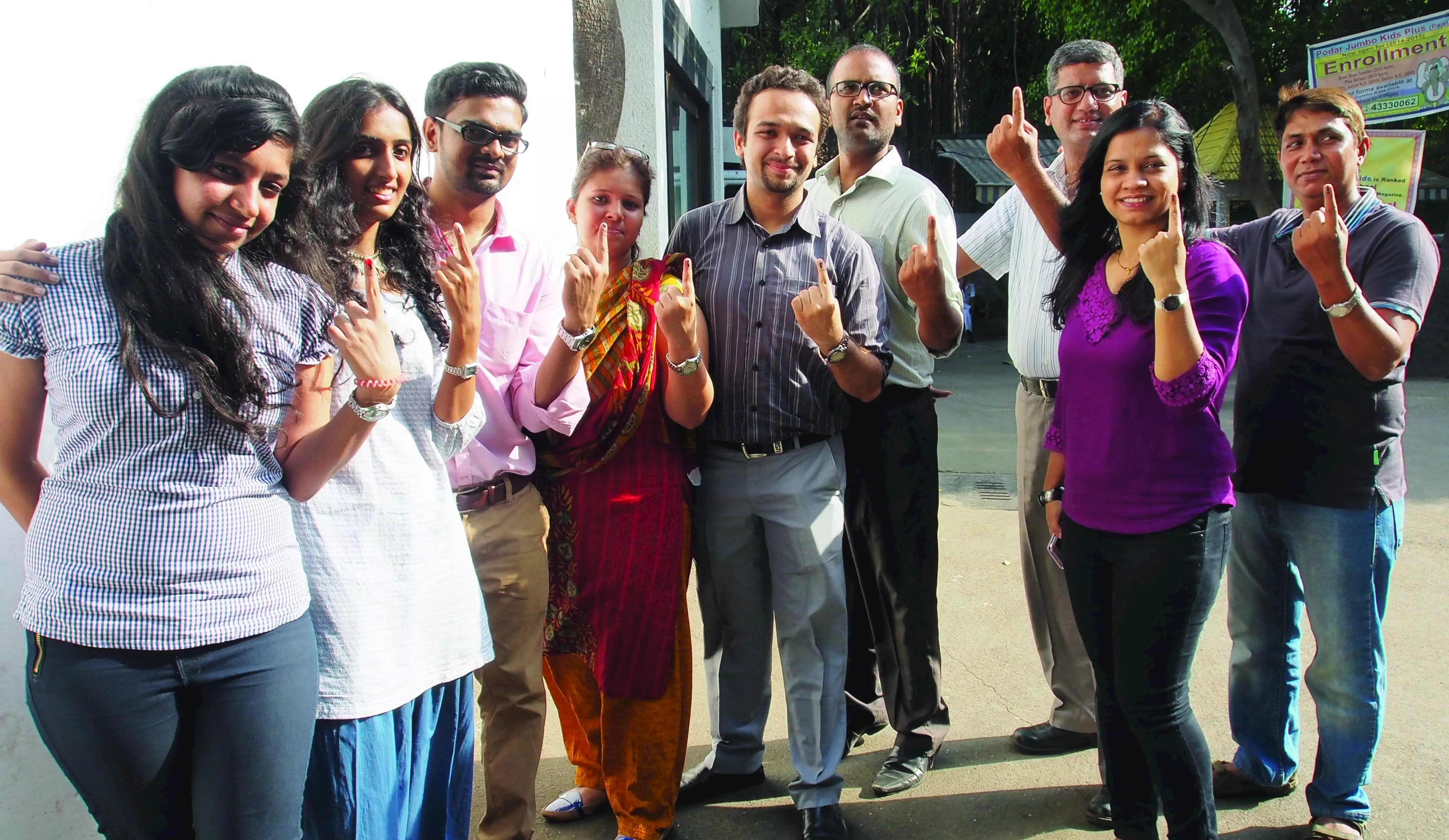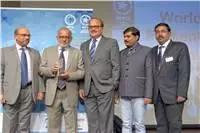Cash Elections. WorldStar Awards. Top Jobs - The Noel D'cunha Sunday Column
Even as one party romped home with a massive mandate, a look at the seamier side of elections and startling facts such as the EC seizing Rs 283 crore in cash some of it printed, spuriously.
16 May 2014 | By Noel D'Cunha
It is definitely a cause for concern. To celebrate print, I look at the top jobs at the World Star Awards and Kyoorius Awards, plus a special mention of Pragati's annual calendar. Read all this and more in this column...Rs 283 crore of cash
India is a cash economy.
Money drives everything from business to Bollywood to BCCI to elections. Even in the town of Nievenheim, where Rushikesh Aravkar and I are stationed; to the trade fair ground in Dusseldorf, most of the Indians at the Messe were tracking the voting patterns on our Election Apps. The Europeans were mind boggled that more than 850 million people had voted over nine phases making it - perhaps - the largest election ever.
The seamier side of elections was how the Election Commission (EC) has seized Rs 283 crore in cash and 2.13 crore litres. A printer from Hyderabad told me that the EC has recovered Rs 131 crore in cash and one crore litres of liquor till 2 May.
These are staggering numbers. Since other than cash and liquor, other articles like jewelry and clothes and sarees with the PM candidate image screenprinted on it and parties distributing to voters to get their votes.
I am assuming only 10% of black money and illegal funds have been traced by the patrolling squads. This means a lot of cash has to be traced by the members of the Central Revenue Service departments like Income Tax, Customs and Excise, plus the policemen from the state governments.
The big question is: is all this currency legitimate? And who prints the illegal currency? Who is providing the paper, ink, and special features?
Valsad and Narmada in Limca book of records
 My colleague Mihir Joshi informs me the reason: a 30-year turnout record. This has been primarily due to two programs by the EC to boost people’s participation. This has ensured the Guinness World Records in Narmada and Valsad (both in south Gujarat). The details are: under the EC’s Systematic Voters’ Education and Electoral Participation (SVEEP) programme, a campaign to sign a one-page written pledge was taken up in Narmada district. This campaign collected 58,398 signed pledges on 2 April and has been awarded the status of a Guinness World Record with the title “Most Pledges to Vote in an Election”.
My colleague Mihir Joshi informs me the reason: a 30-year turnout record. This has been primarily due to two programs by the EC to boost people’s participation. This has ensured the Guinness World Records in Narmada and Valsad (both in south Gujarat). The details are: under the EC’s Systematic Voters’ Education and Electoral Participation (SVEEP) programme, a campaign to sign a one-page written pledge was taken up in Narmada district. This campaign collected 58,398 signed pledges on 2 April and has been awarded the status of a Guinness World Record with the title “Most Pledges to Vote in an Election”.
Meanwhile the second record, reported in one of the Indian newspapers, has been established in Valsad, about sending postcards to all voters. This program took up an unique initiative, kartavyabodh abhiyan. These postcards were painted or written upon by students and NGOs with the message “Thank you for voting” and then posted to all 10.96 lakh voters of Valsad. As per the EC team, this event of “most people sending a postcard from a single location simultaneously”, held in Bulsar District Cricket Association Cricket Stadium, Valsad, on 10 May, has been awarded Guinness status.
An amazing-innovative way to motivate the Indian voter.
Kudos to the EC.
Paper Products, ITC, Biostadt and Ecobliss star at WorldStar
Meanwhile Interpack saw India leave a stamp on the Wordstar Awards.
Of the total 249 packaging projects submitted for the competition, from 35 countries, 109 were honoured with the WorldStar. Among these, The Paper Products, ITC Packaging and Printing SBU, Biostadt India and Ecobliss India are the four Indian companies that were recognised with the award for their excellence in packaging design.
The Mumbai-based Biostadt is a bio-fertilizer manufacturing company, which caters to farmers across India. Its HDPE Gagar pack for Nanozim granules is user-friendly in terms of use of pack after the product is utilised. It is uniquely designed considering the farmers’ requirements.
The Paper Products (PPL) was awarded in the beverages category for GSK Horlicks Gold package. The highlights of the print job were various combinations of super metallic inks and varnishes used to enhance the graphics, narrowing it down to use special pigment gold ink, resulting in super rich golden colour. The final shrink sleeve is a high shrink grade PVC with reverse print carrying special pigment inks.
Meanwhile Ecobliss’ innovative blister carton received an award in pharmaceutical and medical category. It is a box-shaped blister pack similar to a folding carton without any glue flaps.
ITC’s Vivel soap packaging is the epitome of consumer convenience. The soap is packed in a well crafted flip top carton with easy to break perforations, surrounded by a laser silver diffraction foil band, to give the consumer a unique open-close experience. This soap carton comes with a shrink wrapper with a handy tear-off strip which, according to the jury is something that any other soap is yet to portray. This mechanism lets you take off the shrink wrap with elegance and the soap is also well protected to retain the freshness.
Most of the samples will be on display at the IIP demo centre. Do see them.
Kyoorius Awards: More than 900 entries
Meanwhile, the PrintWeek India team attended the jury day of print awards at Nehru Centre, which displayed print ads and posters. The showcasing of the entries to India's second industry-wide advertising awards, Kyoorius Awards was "open" to the public.
The Awards has been initiated by Rajesh Kejriwal, the director at Transasia Fine Papers (many readers know him as the man who defined the use of speciality paper among premium print firms in India). Kejriwal has also founded Kyoorius Exchange that till now organised a design awards and published a design magazine, the Kyoorius Awards is hoping the re-define the awards space.
Based on the pictures that were sent to me on WhatsApp; the print jobs that stood out were: the Asian Paints waterproof booklet; the mass-scale printing of a doctor's visiting cards at the back of the weighing scale tags; the intriguing use of jeans which was integrated into a OOH campaign; and finally the WWF campaign with invisible ink which had a "hidden" message.
An amount of Rs 40 lakh, including proceeds from the entries (Rs 7,000-12,000 per entry), will be ploughed back to spur training of young creative minds in ad agencies.
Well done Mr Kejriwal. The print empire strikes back.
Pragati Calendar: time to oooh and aah
My colleague, Tanvi Parekh, sent me a video clip of the Pragati calendar from her HTC OneX.
From the look of it, the seven sheeted Pragati Calendar 2014-15 features a unique date pad design that liberates it from the main sheets. The date pad is printed on the last sheet. Each tear-away strip has two months on it, printed front and back. Once one tears along the perforation and affixes the strip to the bottom of the black board, it sticks to it magnetically.
A note from Pragati says: At the end of the month, one can peel off the strip and flip it to get to the next month. Thus, you can retain your favourite visual for the entire duration of the calendar; change to a new one without waiting for the month to end; or simply enjoy the posters without the pad.
A word about the calendar: the calendar from the PrintWeek India Printing Company of the Year 2013 has kicked off a huge debate in our office in Mumbai. The print technologists are most impressed but the designers feel it's a bit cumbersome; especially the bit about peeling off the strip.
The first thing I intend to do when I get to 5022 (my desk), is look at this piece of work by Pragati; and then do, what I normally do, hang it for display in our boardroom for others to "oooh and aaah".
PS: I started this piece with staggering numbers. Let me end with humungous numbers. India’s metal can specialist, Hindustan Tin Works, has exported more than one billion can ends in the last five years. It celebrated this landmark achievement at Interpack. The company has been accredited as a Star Exporter by Government of India for exporting one billion can ends of the total tally of four billion that is manufactured in India.
Kudos to India.













 See All
See All